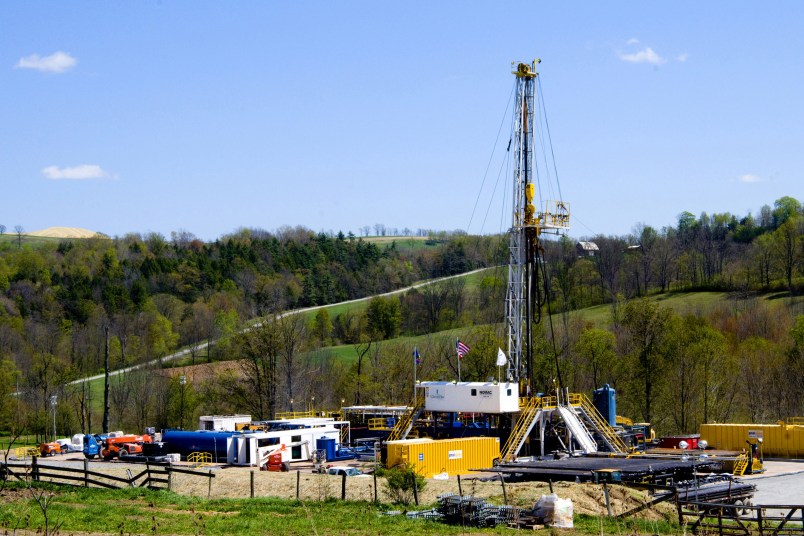PITTSBURGH (AP) — After early complaints that out-of-state firms got the most jobs, some local construction trade workers and union members in Pennsylvania, Ohio and West Virginia say they’re now benefiting in a big way from the Marcellus and Utica Shale oil and gas boom.
That vocal support from blue-collar workers complicates efforts by environmentalists to limit the drilling process known as fracking.
“The shale became a lifesaver and a lifeline for a lot of working families,” said Dennis Martire, the mid-Atlantic regional manager for the Laborers’ International Union, or LIUNA, which represents workers in numerous construction trades.
Martire said that as huge quantities of natural gas were extracted from the vast shale reserves over the last five years, union work on large pipeline jobs in Pennsylvania and West Virginia has increased significantly. In 2008, LIUNA members worked about 400,000 hours on such jobs; by 2012, that had risen to 5.7 million hours.
Nationally, the Bureau of Labor Statistics says total employment in the nation’s oil and gas industry rose from about 120,000 in early 2004 to about 208,000 last month. Less than 10 percent of full-time oil and gas industry workers are represented by unions.
Alex Paris, head of a Pittsburgh-area contracting firm founded by his grandfather in 1928, said many of the jobs in the early years of the boom went to out-of-state workers, perhaps because the biggest drilling firms come from Texas and Oklahoma. Now there’s been a shift to hiring local contractors that use union labor.
“It has created more work for our business. There’s jobs here for the first time in many, many years. Legitimate, good-paying jobs,” Paris said of a region that was hit hard by the decline of the steel industry in the 1980s and ’90s.
The increasing use of union construction labor has given energy companies a powerful ally as drilling is debated in communities nationwide. Many Republicans have been pro-drilling, but now some unions traditionally associated with Democrats are using their political clout to urge politicians to reject bans on pipelines or drilling.
For example, LIUNA has urged members of Congress to support liquefied natural gas exports and regional gas pipeline expansions, and union members plan to participate in a pro-drilling rally in Pennsylvania’s capital next month.
“The unions are powerful and influential,” said David Masur, director of Penn Environment, which has been critical of the drilling boom.
The Marcellus and Utica shale fields, rich in natural gas and oil, lie deep underneath large parts of Pennsylvania, Ohio and West Virginia, and more than 6,000 new wells have been drilled there over the last five years.
In the early days of the shale drilling boom, there were complaints about the number of local jobs. In 2010, one union leader told a Pennsylvania House Labor Relations Committee that local people had little or no success in getting work from the industry. And even now some powerful unions are withholding judgment. Anthony Montana, a spokesman for the United Steelworkers, declined to comment on how much drilling is helping that industry.
But others say the trend toward more local jobs is clear.
Mike Engbert of the Ohio Laborers District Council said that while some companies still use a lot of out-of-state labor, “Across the board, job gains have really shot up.”
For some, the drilling-related work is a big improvement over low-wage service jobs.
“I’ve probably worked 15 jobs, and none of them nearly as stable as this one, or nearly as interesting,” said Amy Dague, 38, of Wheeling, W.Va. She’s worked for a pipeline construction and maintenance company for a little more than a year.
“It’s definitely changed the way I see my future. I see this as long-term employment,” Dague said.
Some energy companies say they’re happy with local workers, too.
Matt Pitzarella, a spokesman for Range Resources of Fort Worth, Texas, wrote in an email: “We are in need of reliable, consistent, quality work at a reasonable price and the local trades have stepped up in a significant way.”
Some environmental groups worry that what’s happening in the region is a repeat of the battle over the Keystone XL pipeline, when some major unions and green groups took opposite sides. Penn Environment has called for much stronger regulations and a ban on drilling in some areas, such as state forests.
“I understand the dynamic at play. It feels fairly short-sighted,” Masur said of how workers and unions are embracing oil and gas drilling. “This could leave the same sort of legacy as coal.” He urged more investments — and thus jobs— in wind and solar power.
Copyright 2014 The Associated Press. All rights reserved. This material may not be published, broadcast, rewritten or redistributed.






